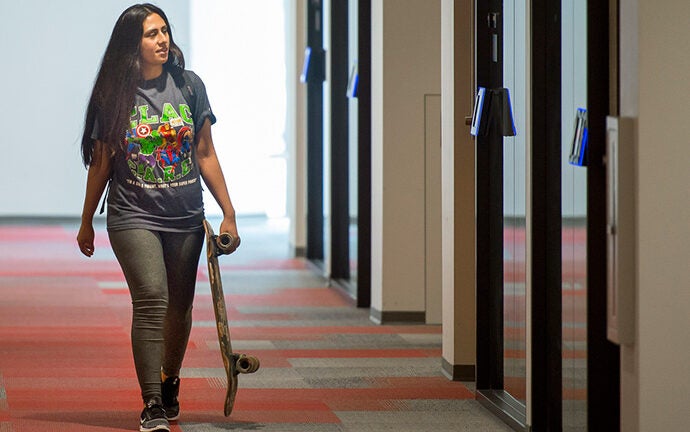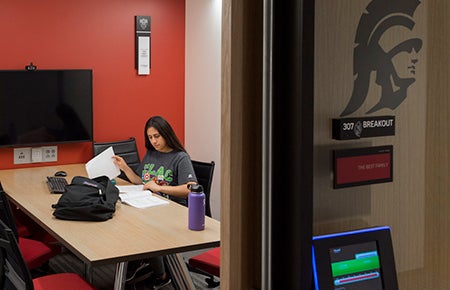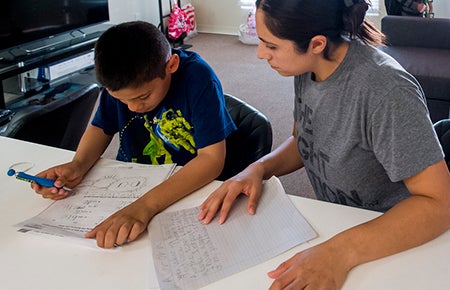
Trojan Guardian Scholars program helps former foster youth succeed
Carmen Noyola circles a few words on a sheet of her son’s English homework in her Los Angeles apartment.
“Read this, Adam. Read me what you wrote,” says Noyola, 25, sitting at her kitchen counter next to the 7-year-old.
It’s a scene played out in homes across the nation: a single working mom on a limited income trying to get her child through school. Except that after his homework is done and Adam goes to bed, it will be Mom’s turn to study late into the night.
Noyola is majoring in NGOs and social change at USC Dornsife. She’s not stopping there, either: She was recently accepted into USC’s progressive Master of Planning program.
But to Noyola, the difficulties of balancing motherhood, work and college are worth it. It will mean a new life for her and Adam.
Noyola is one of a small group of former foster youths at USC, a population that faces a tough climb in higher education.
While most former foster youth — 70 percent — aspire to attend a university, only 3 percent graduate with degrees, according to the organization Foster Care Counts.
A lifeline of support
Young adults aging out of the foster care system battle challenges such as homelessness, unemployment, incarceration, substance abuse and early parenthood. These are all issues Noyola knows firsthand, whether through her own personal experience or that of her immediate family.

Juggling her studies, a part-time job and child care is difficult, but Noyola finds support through groups such as the Trojan Guardian Scholars.
In recent years, USC has devoted more intensive resources to students coming out of the foster care system, providing support such as tutoring and guidance on applying for financial aid. The university sees the programs as a key part of its effort to make college accessible to highly academically qualified students regardless of their socioeconomic background.
Noyola says when times get tough, one such program — USC Dornsife’s Trojan Guardian Scholars — has been there for her. Since 2013, the program has offered services to former and current foster youth on campus, connecting them to resources and offering tutoring and counseling. So far it has helped at least 18 students.
Noyola has gone to the program for help with rent or paying a babysitter, problems it has helped solve by connecting her to outside organizations. In addition to receiving free tutoring and counseling, the program also helped her find a sense of community, enabling her to attend holiday dinners.
She also participated in a pilot program to address food scarcity, the Virtual Food Pantry, receiving up to three $25 Ralph’s gift cards a semester. She says she often skips meals.
“Trust me, there’s no time to prep. I try and do the best I can,” she said.
These programs are designed to help the students successfully maneuver through college life. In return, students like Noyola bring a unique perspective to their coursework, classes and relationships on campus, making for a stronger student body.
When Noyola graduates in 2019, she will join her sister as the first generation in the family to have a high school diploma, much less a college education.
She wants to use her education to help other youth like her by working to create affordable, permanent housing for former foster and probation youth aging out of the system.
“They’re expected to have their lives together and make it own their own,” she said, noting many are without financial resources or family. “Many become homeless or incarcerated because they do things to survive that are not always the best.”
While on campus or in a lecture hall, sometimes with Adam by her side working on his homework, it sometimes hits her how far she has come.
“I don’t think I would have ever dreamed of being at USC,” she said.
Into foster care
A judge placed Noyola in foster care as a teenager, after school fights and experimenting with drugs led her to stints in juvenile hall.
She said many of her issues stemmed from trauma. At 5 years old, she was sexually abused. It created an anger that grew stronger over time. Her family didn’t know how to deal with it, she said.

Carmen Noyola and her son Adam, 7, go over his homework while his friends stop by for a visit.
Noyola ended up finishing high school, walking at graduation just days after giving birth to Adam. “It’s because of him I am where I am today,” she said.
She tried to make it work with his father but eventually left him, finding housing in Whittier and deciding to dedicate herself to school at East Los Angeles College.
Her identical twin, Lucero Noyola — also a former foster probation youth and teenage mother — had transferred to USC. When Carmen Noyola realized she missed other schools’ deadlines, her sister called to see if USC was still accepting applications. It was — and she got in.
Financial help
Noyola wouldn’t be at USC without financial support. The biggest chunk is a USC university grant, aid that doesn’t have to be repaid. The rest of her tuition is supported by Cal Grants, federal grants and donations from organizations that support foster and probation youth.
As she juggles parenting, a full course load and a 20-hour-a-week work-study job at the USC Marshall School of Business, Noyola sometimes feels like she’s barely keeping her head above water.
“I just think if I was able to make it this far, I can push through,” she said.
However, she struggles with feelings of guilt — guilt for being so busy, for not being able to take Adam hiking, the thing he loves doing most with her.
“I think that’s always affecting me,” she said, tears in her eyes.
Role model
Lately, her schoolwork is mounting. She has to maintain good grades to receive financial aid.
She worries about Adam. His dad has been in jail and Adam has experienced some bullying at school. She wishes she could be more of a mom.
But it’s clear Noyola is a role model.
Adam runs from the kitchen to his room and goes through a cabinet, pulling out USC T-shirts of different colors and holding them up. Noyola asks which is his favorite.
“All of them,” he says.
Adam says he wants to go to college someday, “especially the one she goes to because it’s USC and it’s like our whole town.” He might be a paleontologist, but he’s keeping his options open.
When Noyola thinks about how hectic Adam’s life is — and hers — it can make her emotional. But she knows they will make it.
“I just want him to have a good life — experience stuff I never got to experience. A good stable family, a secure foundation,” she said, tears falling down her face. “I want him to think, ‘My mom did her best.’ I want him to be proud of me.”